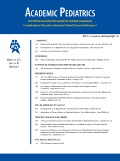
Academic Pediatrics
Scope & Guideline
Exploring the future of pediatric medicine and care.
Introduction
Aims and Scopes
- Pediatric Health Care Delivery:
Research focusing on the effectiveness, accessibility, and quality of pediatric health care services, including innovative models of care such as telemedicine and school-based health centers. - Social Determinants of Health:
Investigations into how factors like socioeconomic status, race, and neighborhood environments impact children's health outcomes and access to care. - Child Development and Well-Being:
Studies that explore the developmental milestones of children, early childhood education, and interventions that promote healthy development and school readiness. - Mental Health and Behavioral Health:
Research addressing pediatric mental health, including the prevalence of mental health disorders, access to care, and innovative treatment approaches. - Education and Training in Pediatrics:
Exploration of medical education, residency training, and continuous professional development strategies for pediatric healthcare providers. - Family and Community Engagement:
Emphasis on the role of families and communities in healthcare decisions, and the importance of incorporating their perspectives into pediatric practice. - Health Equity and Advocacy:
Research that highlights disparities in pediatric health and advocates for policies and practices that promote equity in health care access and outcomes.
Trending and Emerging
- Telehealth and Digital Health Innovations:
The COVID-19 pandemic has accelerated the adoption of telehealth services, leading to a surge in research exploring the effectiveness, accessibility, and implementation of digital health solutions for pediatric care. - Impact of Social Determinants on Health Outcomes:
There is an increasing focus on understanding how social determinants of health—such as economic hardship, housing instability, and food insecurity—affect pediatric health outcomes and access to care. - Racial and Ethnic Health Disparities:
A growing body of literature addresses the disparities in health outcomes among racial and ethnic minority populations, emphasizing the need for targeted interventions and advocacy. - Mental Health Awareness and Integration:
Research on pediatric mental health is trending upward, with an emphasis on integrating mental health services into primary care and addressing the mental health crisis exacerbated by the pandemic. - Parent and Caregiver Engagement:
Emerging studies highlight the importance of involving parents and caregivers in pediatric care decisions and the impact of their engagement on health outcomes. - Interdisciplinary Collaboration in Healthcare:
An increasing emphasis on interdisciplinary approaches to pediatric care is evident, with studies exploring collaboration among healthcare professionals, educators, and community organizations. - Innovations in Medical Education:
There is a rising interest in new educational strategies and curricula aimed at preparing pediatricians to meet the evolving needs of children and families effectively.
Declining or Waning
- Traditional Pediatric Practices:
There appears to be a decrease in research focusing solely on traditional pediatric practices, as the field increasingly embraces interdisciplinary approaches and innovative care models. - Generalized Pediatric Health Topics:
Research that broadly covers pediatric health without specific context or focus is becoming less common, as the journal prioritizes studies with a clearer impact on health outcomes or policy. - Isolation of Pediatric Subspecialties:
There is a trend away from studies that only address pediatric subspecialties in isolation, with a growing emphasis on integrated care models that consider the whole child and family context. - Limited Focus on Acute Care:
Research that solely addresses acute care settings without considering the broader context of community health and preventive care is becoming less frequent. - Single-Factor Analyses:
The journal is moving away from studies that analyze single factors affecting child health, favoring more complex, multifactorial analyses that reflect real-world scenarios.
Similar Journals

Children-Basel
Transforming challenges into solutions for children's health.Children-Basel is a prestigious peer-reviewed academic journal published by MDPI, focusing on the field of Pediatrics, Perinatology, and Child Health. Established in 2014, it has gained significant recognition, evidenced by its Q2 ranking in the 2023 Category Quartiles, placing it among the top journals in its category. With an E-ISSN of 2227-9067, the journal embraces an Open Access model, making it widely accessible to researchers, practitioners, and students worldwide. This accessibility encourages the dissemination of critical knowledge and innovative research findings that address the myriad challenges and advancements in child health. Operating from its base in Basel, Switzerland, Children-Basel aims to foster a global dialogue among professionals dedicated to improving the health and well-being of children, thereby enhancing the scientific understanding and clinical practice within this vital field.
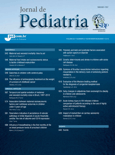
Jornal de Pediatria
Transforming pediatric health with cutting-edge insights.Jornal de Pediatria, published by the Sociedade Brasileira de Pediatria, stands as a premier platform for research and advancements in the field of pediatrics, perinatology, and child health. With an impressive Q1 category ranking in the 2023 metrics, this journal emphasizes the highest standards of scholarly excellence, evident in its Scopus rank of 51 out of 330 in its category, placing it in the 84th percentile. Since its establishment in 1945, its commitment to disseminating crucial research has evolved as it transitioned to an Open Access format in 2013, thereby enhancing the accessibility of vital pediatric knowledge to researchers, healthcare professionals, and students globally. Based in Brazil, the journal continues to foster an informed community around pediatric health issues, ensuring that findings lead to improved health outcomes for children and adolescents worldwide.

Pediatric Investigation
Transforming pediatric care through collaborative research.Pediatric Investigation, published by WILEY, is an esteemed open-access journal dedicated to advancing the field of pediatrics, perinatology, and child health since its establishment in 2017. With an ISSN of 2096-3726 and E-ISSN of 2574-2272, this journal aims to disseminate high-quality research and innovative practices that address critical issues affecting children's health and well-being. Notably, it has achieved a commendable Q2 ranking in the 2023 category of Pediatrics, Perinatology and Child Health, with a Scopus rank of #124 out of 330, positioning it in the 62nd percentile—a testament to its growing impact in the academic community. With a commitment to open access, Pediatric Investigation ensures that researchers, healthcare professionals, and students can freely access cutting-edge studies, fostering collaboration and knowledge sharing in the global pursuit of pediatric excellence. The journal is located at 111 River St, Hoboken 07030-5774, NJ, USA, reflecting its central role in the United States' research landscape.
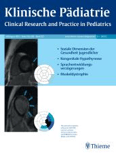
KLINISCHE PADIATRIE
Connecting Ideas to Impact in Pediatric HealthcareKLINISCHE PADIATRIE is a prominent academic journal published by GEORG THIEME VERLAG KG since its inception in 1972. Based in Germany, this journal serves as a valuable resource for professionals and researchers in the fields of Pediatrics, Perinatology, and Child Health. With an ISSN of 0300-8630 and E-ISSN 1439-3824, it features a rich array of peer-reviewed articles that focus on child health and development, encompassing clinical practices, therapeutic advances, and interdisciplinary approaches to pediatric care. While the journal operates on a subscription basis, its impact within the academic community is evidenced by its ranking of Q3 in Pediatrics, Perinatology, and Child Health as of 2023, and it maintains a solid standing within Q4 in Medicine (miscellaneous). The journal aims to bridge the gap between emerging research and clinical practice, providing a platform for innovative ideas that enhance pediatric care. Researchers, medical professionals, and students alike will find KLINISCHE PADIATRIE an essential addition to their academic repertoire, fostering advancements in pediatric healthcare and enriching knowledge in this vital field.

Pediatric Reports
Discovering breakthroughs in pediatric care, one study at a time.Pediatric Reports is a distinguished open-access journal dedicated to the field of pediatrics, published by MDPI from its headquarters in Basel, Switzerland. Since its inception in 2009, the journal has aimed to advance the understanding and treatment of pediatric health through the publication of high-quality research articles, reviews, and clinical studies. With its current ranking in the Q2 category for Pediatrics, Pediatric Reports stands out in its commitment to disseminating innovative findings that contribute to the well-being of children. The journal is indexed in key databases and has gained recognition within the scientific community, as evidenced by its respectable Scopus rankings in Nursing and Pediatrics. Researchers, healthcare professionals, and students will find this journal to be an invaluable resource, as it fosters collaborative knowledge exchange and promotes evidence-based practices in pediatric care.

INDIAN PEDIATRICS
Empowering pediatricians through groundbreaking research.INDIAN PEDIATRICS is a renowned peer-reviewed journal dedicated to advancing the field of pediatrics, published by Springer India. Since its inception in 1964, the journal has been instrumental in disseminating high-quality research and clinical insights, addressing a wide array of topics including pediatric health, perinatology, and child development. With an esteemed categorization in the Q2 quartile in Pediatrics, Perinatology, and Child Health and a respectable Scopus ranking (Rank #123/330), INDIAN PEDIATRICS continues to play a vital role in shaping pediatric healthcare practices in India and globally. The journal aims to provide a platform for researchers, clinicians, and practitioners to share innovative findings, impacting policy and clinical practice. As an essential resource for professionals and students, it not only enhances knowledge but also encourages discussions in the ever-evolving realm of pediatric medicine. Engage with the latest research and contribute to the growing body of evidence aimed at improving child health outcomes.
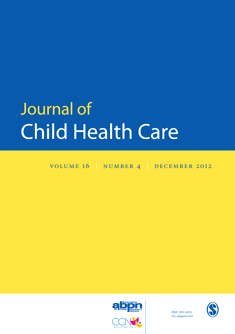
Journal of Child Health Care
Connecting researchers and practitioners for better child health outcomes.The Journal of Child Health Care, published by SAGE Publications Ltd, is a leading academic journal focused on advancing the field of pediatric health. With an ISSN of 1367-4935 and an E-ISSN of 1741-2889, this esteemed journal has maintained a reputation for excellence since its inception in 1997. Covering a wide range of topics in pediatric nursing and child health, it is proudly ranked in the Q1 category of Pediatrics and Q2 in Pediatrics, Perinatology, and Child Health as per the 2023 category quartiles. The Scopus ranking places it among the top resources in the fields of Nursing and Pediatrics, with an impressive 90th percentile ranking. Researchers, healthcare professionals, and students rely on this journal for cutting-edge insights, innovative practices, and evidence-based research that significantly contribute to improving child health outcomes. Although it does not currently offer an open access option, its rigorous peer-review process ensures the highest quality of published research. With contributions shaping the future of child health care, the Journal of Child Health Care stands as a vital resource for those committed to enhancing pediatric wellness in the United States and beyond.
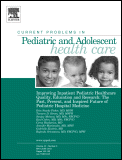
Current Problems in Pediatric and Adolescent Health Care
Transforming knowledge into better health outcomes for youth.Current Problems in Pediatric and Adolescent Health Care is a distinguished peer-reviewed journal published by Elsevier Science Inc, dedicated to advancing the field of pediatric and adolescent health. With an impressive Impact Factor indicative of its relevance—ranking in the 79th percentile in its category and classified in Q2—this journal serves as a vital resource for healthcare professionals, researchers, and students. Covering a wide range of topics from clinical practice to innovative research findings in pediatrics, this scholarly publication is essential for those involved in optimizing health care for children and adolescents. The journal's comprehensive articles and reviews from 1996 to present reflect the evolving landscape of child health, making it a key contributor to evidence-based practice and policy-making in the United States and beyond. While the journal is not open access, readers gain invaluable insights to further their knowledge and improve healthcare outcomes for the younger population.
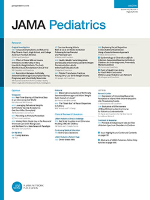
JAMA Pediatrics
Innovating pediatric medicine one study at a time.JAMA Pediatrics, with ISSN 2168-6203 and E-ISSN 2168-6211, is a premier journal published by the American Medical Association that focuses on the rapidly evolving field of pediatrics, perinatology, and child health. Recognized for its significant contributions, this journal boasts a remarkable impact factor and ranks in the top tier of its category as indicated by its Q1 quartile status in 2023. With a Scopus ranking of 2nd out of 330 in its domain, JAMA Pediatrics is positioned in the 99th percentile, reflecting its influence and the high-quality research it disseminates. The journal aims to advance the health and well-being of children worldwide through the publication of cutting-edge research, systematic reviews, and clinical studies. Its open access options offer a greater reach, engaging a diverse audience of researchers, healthcare professionals, and students dedicated to improving pediatric care. As it continues to innovate and inspire, JAMA Pediatrics remains a vital resource for those committed to enhancing child health through evidence-based practice.

PAEDIATRIE UND PAEDOLOGIE
Exploring child development with academic precision.PAEDIATRIE UND PAEDOLOGIE is a reputable journal published by SPRINGER WIEN, focusing on the field of pediatric medicine and child health. With an ISSN of 0030-9338 and an E-ISSN of 1613-7558, this journal has a rich legacy dating back to its inception in 1971, marking a considerable contribution to the academic discourse around pediatric healthcare until its coverage was discontinued in Scopus in 1997. Although it does not currently offer open access, the journal serves as a vital resource for professionals, researchers, and students dedicated to the advancement of pediatric practices and understanding of child development. The content is meticulously curated to ensure high academic standards, and though it lacks current HIndex or quartile rankings, it remains a significant reference point for those involved in pediatric research. By bridging theory and practice, PAEDIATRIE UND PAEDOLOGIE continues to be an essential platform for knowledge dissemination in the domain of pediatric health.